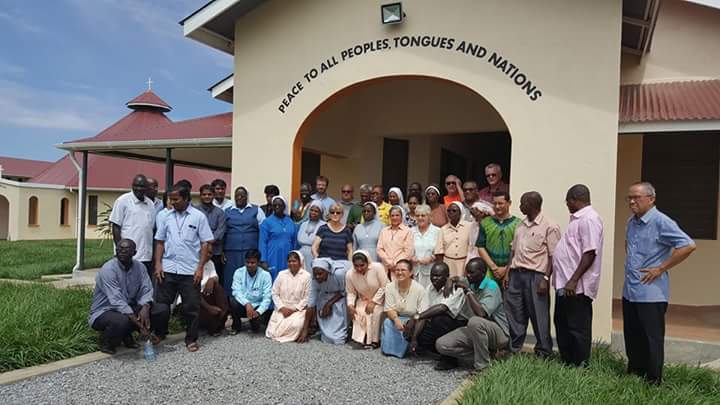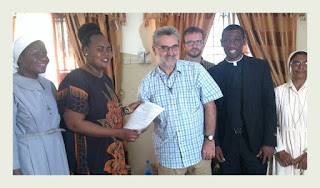YOUTH MINISTRY, MENTORING AND ACCOMPANIMENT WORKSHOP
Intra Africa Hotel, Juba
May 17-19, 2016
Narrative Report
From May 17-19, 2016, we were privileged to be able to conduct a three full-day workshop in Juba, South Sudan on the topic of Youth Ministry, Mentoring and Accompaniment. This event was to build upon the workshop of last year which examined the Discernment and Accompaniment of Vocations to the Priestly and Religious Life. Following last year's workshop, the vast majority of participants expressed the need to have further training. Upon reflection, it was decided to choose this year's theme as a way to not only offer more assistance to those engaged in the initial formation of candidates to the religious and priestly life, but also to assist those engaged in the general formation of young people. Our rationale was that all Catholic youth ministry should aim to assist young people to discern their path in life in the light of their Baptismal calling, and this in turn directly impacts on discernment of the more specific vocation to religious and priestly life.
As we did last year, we again invited participants from all religious congregations in South Sudan along with representatives from each of the Dioceses. The response actually exceeded our expectations so that over the three days, we were able to accept 48 participants coming from every diocese of South Sudan: Juba, Tambura-Yambio, Wau, Torit, Rumbek, Yei and Malakal. In total, the 48 participants were comprised of 34 men and 14 women, or 15 Diocesan Priests, 32 Religious and 1 layman. Not included among these numbers were our two facilitators: Fr Augustine Sellam SDB, a member of the Salesians, and Mr Nelson King. Fr Augustine was the main presenter and was present for the whole three days, while Mr King attended the first morning only for his presentation.
The program schedule is at the end of this report and the following is a brief outline of each day:
Day 1:
The morning was devoted to the theme of The Situation and Challenges facing Young People in South Sudan Today. It was presented by Mr Nelson King who has acted as a youth advisor to the Archdiocese of Juba. Mr King is currently engaged in counseling, specifically in the area of HIV-AIDS. He helped to set the stage for our workshop by outlining some of the major challenges facing young people from his own experience. He also offered some ways in which he believed these challenges need addressing. Following his presentation, there was an ample period for questions, clarifications and discussion among the participants. Several raised their own concerns from their experience of working with youth which helped to clarify the expectations and needs of our participants when it came to ministry with youth.
In the afternoon, our main presenter, Fr Augustine Sellam SDB began by looking at the topics: New Wine in New Wine Skins - Youth Ministry in Perspective and Principles, Components and Models of Youth Ministry. Using a combination of Powerpoint Presentations, an animated style of delivering his material, handout questionnaires, and interaction among the participants including through the use of games, Fr Augustine covered the above topics and what followed over the next two days. He not only offered us useful material, but modeled a style that would be attractive and conducive to working with youth.
Day 2:
In the morning of Day 2, we continued with the topic of Models of Youth Ministry, using as a paradigm the journey of the two disciples to Emmaus in Luke 24. We then moved on to the topic of the Qualities of a Youth Minister in which we were offered a chance to reflect on ourselves in terms of how we may or may not be developing the sorts of skills and qualities that are essential for effective ministry with youth. The tips offered by Fr Augustine were helpful in that they were practical and possible to do by most of us.
In the afternoon we then moved to the topic of Youth Mentoring. Again, Fr Augustine used an example from Scripture, namely that of St Paul in 2 Tim 1:ff. Among much material, he spoke of the types: Upward and Downward Mentor and helped us to reflect on our own experience of being mentored by each of these, both necessary and helpful for the young.
Day 3:
On the final morning of the workshop, we began looking at the large topic of Accompaniment in Formation. Part of this was to again look at the characteristics and trends, both positive and negative which are shaping our world and therefore our young people. The question was then asked, "What type of formation are we giving to our candidates in religious and priestly life that will allow them to be at the vanguard of what is happening in our world?" Fr Augustine challenged us by getting us to think in different categories in relation to our candidates and stressing that we must offer them a true perspective of religious and priestly life and not just a dream.
The final session of the day was devoted to the Myer-Briggs Type Indicator. We were each given an opportunity to complete a questionnaire to assist us to identify our type and then we looked at some of the characteristics, strengths and weaknesses of each type as time allowed. This was helpful in that it made us alert to not only our own different working styles and preferences, but to those of our candidates. This enables us to view them according to their differing gifts rather than as simply not fitting in with our own style or personality.
Finally, after some concluding remarks by Fr Augustine, we closed the workshop with the celebration of the Eucharist. Fr Augustine was the main celebrant and led us in prayer using some ways that again might be attractive and helpful for young people. All in all, the whole workshop proved to be most informative, practical and enjoyable. Evaluation forms were distributed to the participants, and all those who responded gave a high score to the helpfulness of both the material and the presenters of the workshop.
Fr Mario Debattista ofm
for the Organizing Committee


















 (Vatican Radio) Saying Jesus' path is serving others, Pope Francis urged Christians on Tuesday to overcome the lure of worldliness and human ambition and warned against social climbers who are tempted to destroy the other in order to reach the top. His remarks came during his homily at the morning Mass celebrated in the Santa Marta residence.
(Vatican Radio) Saying Jesus' path is serving others, Pope Francis urged Christians on Tuesday to overcome the lure of worldliness and human ambition and warned against social climbers who are tempted to destroy the other in order to reach the top. His remarks came during his homily at the morning Mass celebrated in the Santa Marta residence.







